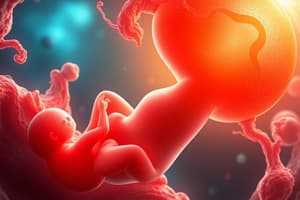Podcast
Questions and Answers
What are the three stages of prenatal development?
What are the three stages of prenatal development?
Zygote, Embryo, Fetus
What important maternal health behaviors should women follow even before they know they are pregnant?
What important maternal health behaviors should women follow even before they know they are pregnant?
Nutrition, no alcohol, rest
What are the support systems for the developing fetus?
What are the support systems for the developing fetus?
Amnion, Yolk sac, Chorion, Umbilical cord
What are the three cell layers that differentiate during the Embryo stage?
What are the three cell layers that differentiate during the Embryo stage?
What triggers testes development in males during sexual differentiation?
What triggers testes development in males during sexual differentiation?
At what point does sexual differentiation become visible on ultrasound?
At what point does sexual differentiation become visible on ultrasound?
When do complex mouth and throat movements emerge in the developing fetus?
When do complex mouth and throat movements emerge in the developing fetus?
At what point is viability outside the womb possible for a developing fetus?
At what point is viability outside the womb possible for a developing fetus?
What is studied to assess fetal health in terms of neurobehavioral development?
What is studied to assess fetal health in terms of neurobehavioral development?
What are the four behavioral states that emerge around 36 weeks of gestation?
What are the four behavioral states that emerge around 36 weeks of gestation?
Flashcards are hidden until you start studying
Study Notes
Stages of Prenatal Development
- Prenatal development consists of three stages: zygote, embryo, and fetus.
- The zygote stage lasts from conception to implantation (10-14 days), during which the fertilized egg travels to the uterus.
- The embryo stage spans from implantation through the 8th week, characterized by the formation of major organs from cell layers.
- The fetus stage lasts 7 months, marked by rapid growth and refinement of organs.
Maternal Health Behavior
- Healthy choices before pregnancy are crucial for fetal development, including proper nutrition, no alcohol consumption, and sufficient rest.
- Risks early on can impact birth weight, cognitive development, and birth defects.
The Zygote
- The zygote travels to the uterus and divides into a ball-like blastocyst.
- Cell differentiation begins, with the inner cell layer forming the embryo and the outer layer forming protective tissues.
Support Systems
- The amnion is a fluid-filled sac that cushions the fetus.
- The yolk sac produces blood cells for the embryo.
- The chorion becomes the placenta lining, gathering nutrients for the embryo.
- The umbilical cord transports waste from the embryo and delivers oxygen and nutrients from the placenta.
The Embryo
- Cells differentiate into ectoderm, mesoderm, and endoderm.
- The neural tube forms the spine and brain, and the heart begins to beat.
- Organs start forming during this stage.
Sexual Differentiation
- Sexual differentiation begins in the 7th-8th week, with the presence of a Y chromosome triggering testes development in males.
- In the absence of a Y chromosome, ovaries develop in females.
The Fetus
- All major organs become functional during this stage.
- Rapid refinement of systems occurs, and movement, senses, and behavior emerge.
- The fetus begins to move (kicking, twisting) and sexual differentiation becomes visible on ultrasound by the 3rd month.
- Complex mouth and throat movements emerge, and responses to sound and light are detected by 25 weeks.
- Organs prepare for birth, and viability outside the womb is possible after 28 weeks.
- Activity slows, and sleep increases near birth.
Sensory Development
- Hearing and touch emerge first, followed by vision, which is the least developed sense at birth.
- Premature fetuses provide insight into sensory development.
Neurobehavioral Development
- Fetal health is assessed by monitoring motor activity, heart rate, behavioral state, and responsiveness.
- This includes startles, stretching, and eye movement patterns.
- Heart rate reduction indicates development, and the fetus responds more vigorously to stimulation from outside the uterus.
- Behavioral states, including quiet sleep, active sleep, quiet awake, and active awake, emerge around 36 weeks.
Studying That Suits You
Use AI to generate personalized quizzes and flashcards to suit your learning preferences.




